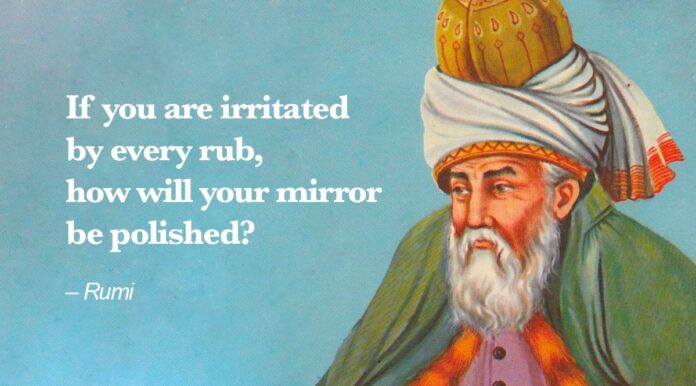Breaking the Spell of the False I’s
~ Kabir Helminski
In my earlier book, Living Presence, The Sufi Path to Mindfulness and the Essential Self, I focused on the role of presence in awakening the essential self. The essential self is our fundamental I-ness before that I-ness becomes identified with various unreal selves. Or to express it another way: Our true “I” has become hypnotized by various “false I’s.”
My essential self, my real “I,” is pure consciousness, sourced in Infinite Life. When this “I” is functioning in the everyday world, it could be described as the awareness function of the Life Force. This Infinite Life Force is embodied within my finite individuality. Individuality is the embodiment of the Life Force endowed with conscious awareness. At the core of individuality is the essential self, which, however, is under the spell of various constructed identities: false selves, roles we play, masks we wear.
These false I’s usurp our essential self and speak in its name, giving distorted and false information which sets in motion various forces that confuse and distort everything—our relationship to others, to events, and to the Life Force.
The study, observation, and disarming of the false self is a vast subject. In Living Presence I described a threefold process involving deconditioning, reconditioning, and unconditioning.
Deconditioning begins when the essential self is activated. Once awakened, it stands apart from personality, or more accurately our sub-personalities (false I’s), and has the capacity to objectively witness them. The essential self’s capacity for witnessing is something miraculous; it’s as if “God” is simultaneously witnessing with us.
A great Sufi, Ibn Abbad of Ronda advised his students to simply keep Allah as their companion in every state. I quote him extensively in my recent book In the House of Remembering. Here is a portion of it:
They endeavor to make Him their Companion in all their spiritual states insofar as they are able. When God discerns that attitude in them He is Merciful to them by causing them not to pay attention to their own weaknesses or strengths in whatever they undertake or leave aside. Instead, He is their safeguard and protection. He guarantees their welfare and sustenance for they are His Servants and are dedicated to serving Him.
Sufis commonly refer to Allah as the Friend (Dost). When God becomes the Friend, it’s sometimes as if we have a companion, one who can sometimes be heard to say, “Are you seeing what I’m seeing?”
When the true “I” is awake, it observes those constructed identities, false I’s, and gradually erases them and the problems they bring. This process of awareness exposes layers upon layers that we have taken to be ourselves but were only layers of conditioning. I have long been fascinated by these lines from Rumi:
Your last unreal “you” has come to your first real “you”
to receive admonition and gifts.[Mathnawi VI, 3775]
I’m not sure, however, if this describes the first stage of the conscious journey or the last! Probably both, because the awakening of the essential self comes after some disillusionment with our false selves. On the other hand, the ultimate encounter with our true identity would be an awesome event.
Practices like meditation, contemplation, and zhikr raise us to a higher level of consciousness from which true change is possible. The process of deconditioning involves reducing the noise, the static, the distortions within the mind. Although different types of people are conditioned in different ways, the common thread consists in the compulsions and coercions of the false self: vanity, pride, envy, resentment, to name a few. We can add to the list all feelings of grievance, of being owed, and “if only….” All these forms of negativity are imaginary problems which arise from the very nature of the false self and the stories it tells.
Among the many sub-personalities, the false I’s that make up our personal identity, most serve several basic motivations. Each motivation is determined by the wish to gain or avoid something that is believed to be good or bad, desirable or undesirable. The totality of these motivations, or urges, is called in Sufi terms dunya (Arabic), in some literature “the world,” or in the Bible “Mammon.”
Religion and morality have focused on controlling worldly desires. According to Roman Catholic theology, the seven deadly sins are typically ordered as: pride, greed, lust, envy, gluttony, wrath, and sloth. Pride, envy, wrath, and sloth are diseases of the ego and the heart, while greed, lust, and gluttony are directly related to physical desires that need to be moderated. These physical desires, of course, can influence and spawn false I’s, and cast a spell over the essential self, but we will set these aside for the moment, focusing instead on a very fundamental tendency that multiplies confusion and suffering in our lives.
I would like to share an illuminating model[1] of how we create suffering for ourselves. It has helped me to see the false self with new understanding. You may find this analysis to be practical and effective in the work of deconditioning.
If we were to objectively observe what causes most of our suffering, we would see that we unconsciously live under a great delusion: that the primary purpose of living is to be as undisturbed as possible. In other words, to maximize pleasure and comfort, to avoid all disapproval of ourselves, and to feel important or admired. This assumption is the foundation of our inner slavery. This assumption is the root of our oppression of ourselves.
This delusion is sustained by seven basic, mostly unconscious, dual motivations:
- To preserve our own existence at any cost, resulting in exaggerated fears and defensiveness
- To gain pleasure and comfort, to escape all pain and discomfort
- To gain attention, often in unconscious ways, and so to avoid being ignored or rejected
- To gain unconditional approval, and to escape disapproval
- To gain a sense of importance, and to escape the sense of inferiority
- To be loved, liked, or desired, and to avoid being abandoned
- To have control over other people, and to escape situations we cannot control.
It is possible to be quite blind to these unconscious motivations, despite the degree to which they dominate us. This is because our essential self is hypnotized by our personality which is dominated by these dual needs. And in our blind and unconscious state we have several primary strategies that we apply to try to reach this imaginary “untroubled” state:
- Complaining. This hasn’t worked so far and merely perpetuates a state of resentment in the complainer and very likely the one complained to.
- Playing the “victim” and demanding our rights. This hasn’t worked so well, either; especially if it entails an avoidance of responsibility.
- Adopting a “mask” to please people. Even if this sometimes works temporarily, it creates inner havoc through the abandonment of our true needs.
- Trying to conform and do as one is told by “authorities.” This opens the door to personal and mass suggestibility and the forfeiting of integrity and authenticity.
- Blaming, shifting responsibility for our state to something external to ourselves. When something seems to go wrong, and we feel irritated, angry, or bitter, we search for a “reason” to blame someone or something for the state we’re in.
- Singing your own praises, self-promotion, self-inflation. Nowadays it’s become acceptable practice through the virtual identities created through social media. Giving undue importance to oneself, usually in comparison to others, is self-defeating. Self-inflation is often allied with hypocrisy, i.e. not applying the same standards to oneself as one applies to others. Seeing others’ faults or weaknesses while rationalizing our own is exactly the opposite of what the spiritual path requires.
Each of these strategies gives birth to false I’s that usurp the primacy of the essential self, our true “I,” speaking in its name to the Life Force, the source of all energy and action. Complaining, blaming, mindlessly following authorities, hiding behind a mask, playing the victim, all these compound distortions and falsehoods that obscure what truly is. Furthermore, these false I’s not only create havoc in our observable relationships, but they confuse and distort our life energies, creating negative thought forms, incoherent messages, all of which have an effect in the realm of manifestation and synchronicity. God does not act in strange ways, but false I’s do. Those who are dominated by these false I’s somehow attract more accidents, misunderstandings, conflicts, and chaos.
So, these are some of the primary motivations of the false I’s and the strategies they create in their misguided attempts to reduce their self-created suffering. The delusion of believing that the purpose of life is to be always undisturbed, to be approved of, to maximize pleasure, and to be in control actually creates a constant resistance to things as they are. This resistance short-circuits gratitude for life’s gifts, consent to reality, and trust in the Divine Intelligence. This fundamental delusion leads to unrealistic expectations and engenders resentment based in the false notion that we should expect to be undisturbed.
These unconscious strategies to attain an illusory state represent a refusal to learn from Life. This posture of defiance causes us to erect defenses and barriers of self-protection which only imprison us in the ego’s own illusions. It is the essential self, operating as “witness,” that can reduce the power of these motivations, strategies, and the false I’s that usurp our true “I.”
And so we come back to deconditioning, reconditioning, and unconditioning.
Deconditioning is the reducing of our identification with the motivations and strategies that arise from our fundamental misconception about the purpose of life, namely to remain forever undisturbed. Deconditioning is breaking the spell that the false I’s have cast over our essential self.
Reconditioning is possible through the witnessing function of the essential self which can transform the false I’s and their distortions. As the essential self awakens, we view the world more impartially and compassionately. While we may have clearer morals and values ourselves, we are less inclined to blame others.
Unconditioning is becoming receptive to grace and inspiration, living more and more with an awareness of Divine Being, growing in the capacity to be grateful, to trust the Divine Intelligence, and to praise and glorify Being/Spirit. Because the essential self is who we truly are, including whatever distinctive individual qualities we have, we live with less resistance. We may also discover that negative situations are somehow transformed when we are there.
Through deconditioning, reconditioning, and unconditioning not only is the self purified, but its spontaneous relationship to the Life Force results in greater health and harmony.
And for the sake of clarity, let us review the key concepts.
The self is simply the experience of “I-ness.” Though the experience of self is habitually conditioned by egoistic distortions, i.e. false selves, these distortions can be reduced by the witnessing capacity of the essential self.
Soul can be defined as the result of the meeting of self and Spirit. The self divorced from Spirit is pure, materialistic ego. The more the self is in alignment with Spirit, the more conscious, soulful, and selfless it is.
What then is the relationship of the heart to the essential self? These two are different aspects of the same thing. The heart is seated on the throne of the essential self. The essential self witnesses objectively; the heart senses qualitatively. The heart is that function of the essential self that perceives beauty, value, quality.
Care of the soul is purifying the self of egoistic distortions so that the self can reflect more of Divine Intelligence, Love, and Being.
The essential self is the witnessing capacity of the individual, and this capacity can transform the distortions of the false selves.
Even without this systematic understanding of essential self, false self, soul, etc., there is a treasure of guidance within our Tradition. Rumi’s immense wisdom illuminates so many of the problematic areas of human life. The primary sources of Islam, the Qur’an and hadiths, provide essential guidance for living a sane and conscious life. Other wisdom traditions may also be sources of effective knowledge once our spiritual compass is working. We have countless examples of a spiritually mature way of being in the life of Muhammad and his companions and heirs, some of whom we have known in our own life.
The more the essential self is awakened, the more there is a quality of I-ness that is capable of presence and remembrance, faithful, aligned with the Life Force, and sustained by Divine Intelligence.



